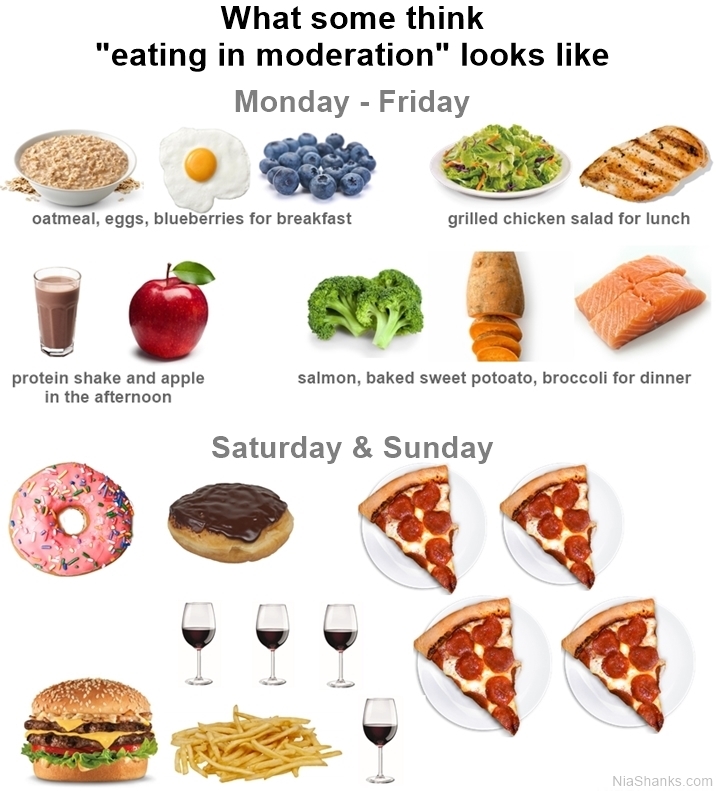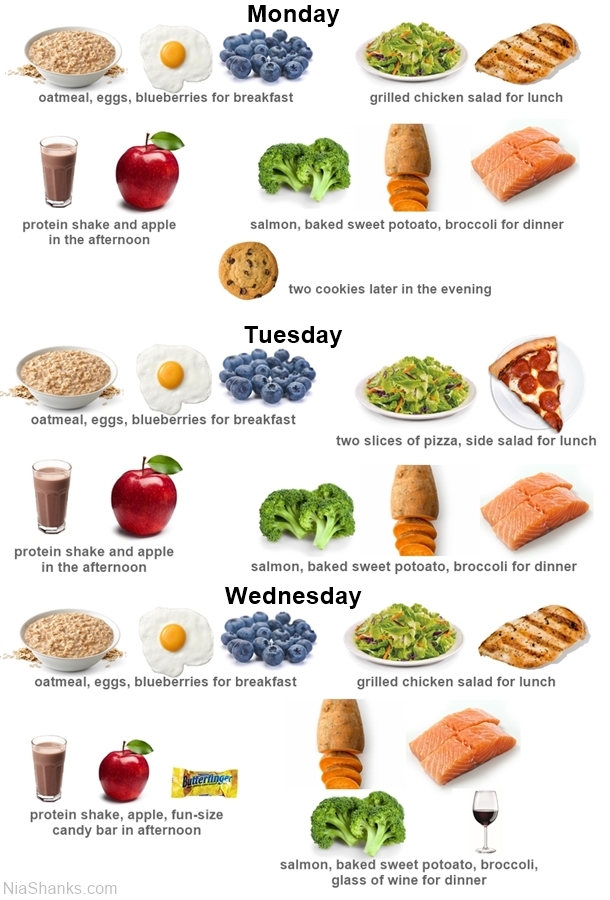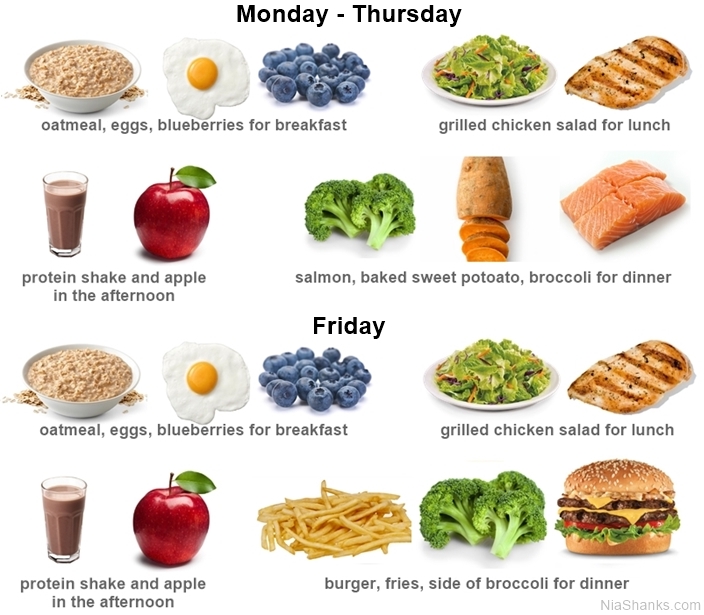drtbear1967
Musclechemistry Board Certified Member
<header class="entry-header"><time class="entry-time" itemprop="datePublished" datetime="2018-03-27T16:33:23+00:00">March 27, 2018</time> by Nia Shanks
</header>
 <audio class="wp-audio-shortcode" id="audio-67350-1" style="width: 100%;" src="https://www.niashanks.com/wp-content/uploads/2018/03/eating-in-moderation-aud.mp3?_=1" preload="auto"><source src="https://www.niashanks.com/wp-content/uploads/2018/03/eating-in-moderation-aud.mp3?_=1" type="audio/mpeg">https://www.niashanks.com/wp-content/uploads/2018/03/eating-in-mo</audio>
<audio class="wp-audio-shortcode" id="audio-67350-1" style="width: 100%;" src="https://www.niashanks.com/wp-content/uploads/2018/03/eating-in-moderation-aud.mp3?_=1" preload="auto"><source src="https://www.niashanks.com/wp-content/uploads/2018/03/eating-in-moderation-aud.mp3?_=1" type="audio/mpeg">https://www.niashanks.com/wp-content/uploads/2018/03/eating-in-mo</audio>
Eating in moderation is a noble goal. Too bad most people suck at it.
What does it mean to “eat in moderation”? We must define it if we’re to practice it properly. The definition varies widely depending on what beliefs someone has about nutrition, but here’s a simplified answer that’s void of stupid nonsense (calling any food group “evil” or “forbidden” or claiming one macronutrient is solely responsible for fat gain) and harmful dichotomous thinking (labeling foods good/bad):
Primarily eat a variety of whole foods most of the time — fruits and veggies, lean meats, fish, beans and legumes, nuts and seeds, herbs and spices, dairy, eggs, whole grains; don’t have “forbidden” or “off-limit” foods; enjoy your other favorite foods (alcohol, doughnuts, cookies, fried foods) occasionally, in reasonable quantities.
Eating in moderation is a logical approach and can eliminate a lot of unnecessary stress and frustration that often accompanies nutrition. However, many people either (a) understand what eat in moderation means, but falter in the execution or (b) have a distorted understanding of what eat in moderation means.
Thanks to our diet-obsessed culture, here is what many people have unfortunately come to believe it means to eat in moderation.

Being “good” during the week and eating the “bad” things over the weekend they successfully abstained from during the week is what some people consider eating in moderation. When you look at the quantity of not-super-healthy foods consumed on the weekend, it’s clear that they constitute a large amount of the weekly average food choices; not so moderate after all.
Here’s a proper example of what eating in moderation could look like.

This is one possible example of how to work in reasonable quantities of treats/refined foods into daily eating choices to successfully practice eating in moderation. This isn’t the only option, however, as some people may prefer to have a larger meal less frequently.

The above images are mere examples. I’m not suggesting you must eat the same foods every day or those foods specifically — the images are examples of whole-food meals that include a good source of protein. The number of daily meals and food choices should be tailored to your eating preferences.
Eating in Moderation Gone Wrong
Eating mostly whole foods and including your other favorite foods in reasonable amounts is not only effective for improving health while allowing you to reach your physique and performance goals, but it’s great for your sanity; you needn’t avoid your favorite foods to reach your goals.
Perception is critical when discussing how to eat in moderation; you need to objectively see what’s happening. Here are three common categories people can fall into when having problems eating in moderation, and the solution for each one.
Example 1: Too Much, Doesn’t Realize It
“I eat sweets and other not-so-healthy foods in moderation, but I still can’t lose weight. Help!”
This category is the most common and the problem isn’t moderation; it’s the execution and perception of what eating in moderation looks like. Many people claim to eat not-super-healthy foods moderately, saying:
“Yesterday I had coffee and oatmeal with a piece of fruit for breakfast, a chicken salad for lunch, a protein shake in the afternoon, and I eat lean meat and vegetables for dinner.”
They say that’s what they’re eating, but the reality, oftentimes, is different. This can be proven by keeping a food journal. Yesterday’s food choices actually looks like this: A large latte made with whole milk and sugar, an instant oatmeal packet that was loaded with sugar, and a banana for breakfast; chicken salad topped with a pile of cheese and bacon and full-fat ranch dressing with a couple breadsticks on the side, and a sugary soft drink for lunch; a meal-replacement shake in the afternoon; a late afternoon doughnut in the breakroom at work; grilled fish with steamed vegetables for dinner, followed by half a dozen cookies and a large glass of milk.
This person claims they’re eating not-super-healthy foods moderately, when they actually make up a large portion of their eating choices. The reason they can’t lose weight is simple math; they’re eating too many calories. Many of their eating choices are calorie dense: full-fat dressing, lattes made with whole milk and sugar, soda, doughnuts, cookies. Those foods aren’t satiating, so they’re easy to overeat.
Solution: Keep a food journal for a week and record everything you eat and drink. This way you see what you are, and are not, eating. Afterward, aim to eat whole foods at least 80% of the time and track again for a week or two.
Example 2: Not Much, Doesn’t Realize It
“I eat sweets and other not-so-healthy foods too often and then feel extremely guilty. Help!”
Thanks to diets with obsessive, non-negotiable rules that come complete with a list of forbidden foods and food groups, this category is growing rapidly. The diet mentality has made people think they have to follow an eating plan perfectly, without deviation, or they screwed up and sacrificed all their hard-fought results.
This individual eats plenty of protein and whole foods at least 90% of the time, but if she enjoys a food in moderation, like a bowl of her favorite ice cream or a couple pieces of pizza, she thinks she over indulged and failed to eat moderately, even though those foods were 10% or less of her weekly average food choices.
This person is struck with guilt, shame, and concern that she screwed up her diet and instantly erased the previous week of work and effort. The problem here isn’t eating in moderation; it’s her mindset and the language she uses about food, and herself. (If I eat this I’m “good”; if I eat this I’m “bad.”)
Recommended Article: The Huge Problem with Guilty-Pleasure Foods
Solution: Vigilant, patient mental training and an abundance of self-compass
ion. Begin by erasing good/bad food labels. Tracking what you eat and drink for a week may help, so you can see what you’re actually eating, and what you’re not. For instance, someone who eats a scoop of ice cream and two pieces of pizza spread throughout the week will be able to see those foods are a very small portion of her eating choices and not some drastic over indulgence.
Example 3: The Domino Effect
Someone eats something “sweet” or “bad” and continues digging the hole deeper. They rationalize I screwed up so I might as well eat whatever I want then I’ll get back on track tomorrow. Certain foods trigger them into a downward spiral of less-than-ideal food choices for an entire day or two. This individual struggles to enjoy treats and certain foods in moderation; like a row of dominos, eating a treat builds inertia that leads to her making a string of less-than-ideal food choices.
Recommended Article: One Simple Hack to Stop Screwing Yourself Over
Solution: This isn’t one size fits all, but it can be helpful to first become aware of the situation and identify the trigger foods, then decide how to handle them. If eating peanut butter causes you to keep eating the peanut butter, how can you handle it? One solution for trigger foods is to portion them into individual-sized servings. This way when you want that food, you grab the container with the appropriate serving size without being tempted to keep digging in for more.
For other foods, it could be best to keep them out of the house and buy a serving when you want it. If you can’t keep a carton of ice cream in the freezer without dipping into it every day, and dividing it into individual servings just doesn’t work, don’t keep it in the house. When you want ice cream, go to your favorite place and buy a couple scoops.
How to Make Eating in Moderation Work for You
Eating in moderation won’t look identical for everyone. The challenge is finding the balance that allows you to reach your physique, health, and performance goals while allowing you to enjoy the lifestyle you’re building and to socialize with ease.
Take emotion out of it. Guilt, shame, pride and other emotions have no place when it comes to responding to what we put in our mouths. Responding emotionally is not the answer to overindulging; it helps absolutely nothing. If you tend to value yourself, positively or negatively, by what you eat, become aware of it and work on changing it.
Recommended Article: Don’t Respond Emotionally to Health and Fitness Slip-Ups
Avoid good/bad food labels. There is just food. Some foods are wholesome and nutritious: eat these most of the time. Some foods are heavily processed and not so nutritious: eat these less often, without a smidge of guilt.
Actively choose what you will enjoy. Plan ahead. If you’d typically have a couple drinks, a few fried appetizers, and an entree that wasn’t exactly healthy when going out on Friday night, have a plan for what you will do so you can enjoy yourself while staying on track. Have a drink; skip the apps; get your favorite entree with a side order of veggies instead of fries. This isn’t deprivation, nor is it overindulgence. It’s balance. It’s moderation.
Don’t have a scarcity mindset. The diet mentality has fueled the perception that we’ll miss out on something if we don’t eat what’s offered to us. This can occur if you work in a setting where food is readily available and people routinely bringing doughnuts, cookies, and desserts. This can cause us to think I have to eat this now because I don’t know when I’ll get something else. We need to realize we don’t have to partake in every eating opportunity, and we’re not missing out by not eating.
Keep a food journal for one week. This simple exercise already mentioned will give you concrete data to analyze. Look at the journal objectively (i.e., free from emotion and judgement) and see where progress can be made. Perhaps you’ll realize that your perception of eating in moderation is skewed. Maybe you’ll see where you can swap out common foods for whole-food options. Or maybe you’ll see you do eat in moderation and need to stop stressing unnecessarily.
Know your personality, and work with it. Some people do better enjoying a treat or favorite not-super-healthy food daily, like a couple pieces of a favorite chocolate or one piece of pizza as shown in the eating in moderation graphic above. Others do better having one larger meal/treat less frequently, like an ice cream sundae or a burger and fries with a favorite beer.
Recommended Article: Why That Diet Didn’t Work for You
Do what works best for you. Eat larger meals of your favorite not-super-healthy foods less frequently (burger, fries, and a beer) or have something smaller most days so you can enjoy your favorite foods more frequently (a cookie each day, one glass of wine in the evening).
Eating in moderation can work for you. Take the time to learn how to practice it properly, in a way that best fits your lifestyle and preferences.
</header>

Eating in moderation is a noble goal. Too bad most people suck at it.
What does it mean to “eat in moderation”? We must define it if we’re to practice it properly. The definition varies widely depending on what beliefs someone has about nutrition, but here’s a simplified answer that’s void of stupid nonsense (calling any food group “evil” or “forbidden” or claiming one macronutrient is solely responsible for fat gain) and harmful dichotomous thinking (labeling foods good/bad):
Primarily eat a variety of whole foods most of the time — fruits and veggies, lean meats, fish, beans and legumes, nuts and seeds, herbs and spices, dairy, eggs, whole grains; don’t have “forbidden” or “off-limit” foods; enjoy your other favorite foods (alcohol, doughnuts, cookies, fried foods) occasionally, in reasonable quantities.
Eating in moderation is a logical approach and can eliminate a lot of unnecessary stress and frustration that often accompanies nutrition. However, many people either (a) understand what eat in moderation means, but falter in the execution or (b) have a distorted understanding of what eat in moderation means.
Thanks to our diet-obsessed culture, here is what many people have unfortunately come to believe it means to eat in moderation.

Being “good” during the week and eating the “bad” things over the weekend they successfully abstained from during the week is what some people consider eating in moderation. When you look at the quantity of not-super-healthy foods consumed on the weekend, it’s clear that they constitute a large amount of the weekly average food choices; not so moderate after all.
Here’s a proper example of what eating in moderation could look like.

This is one possible example of how to work in reasonable quantities of treats/refined foods into daily eating choices to successfully practice eating in moderation. This isn’t the only option, however, as some people may prefer to have a larger meal less frequently.

The above images are mere examples. I’m not suggesting you must eat the same foods every day or those foods specifically — the images are examples of whole-food meals that include a good source of protein. The number of daily meals and food choices should be tailored to your eating preferences.
Eating in Moderation Gone Wrong
Eating mostly whole foods and including your other favorite foods in reasonable amounts is not only effective for improving health while allowing you to reach your physique and performance goals, but it’s great for your sanity; you needn’t avoid your favorite foods to reach your goals.
Perception is critical when discussing how to eat in moderation; you need to objectively see what’s happening. Here are three common categories people can fall into when having problems eating in moderation, and the solution for each one.
Example 1: Too Much, Doesn’t Realize It
“I eat sweets and other not-so-healthy foods in moderation, but I still can’t lose weight. Help!”
This category is the most common and the problem isn’t moderation; it’s the execution and perception of what eating in moderation looks like. Many people claim to eat not-super-healthy foods moderately, saying:
“Yesterday I had coffee and oatmeal with a piece of fruit for breakfast, a chicken salad for lunch, a protein shake in the afternoon, and I eat lean meat and vegetables for dinner.”
They say that’s what they’re eating, but the reality, oftentimes, is different. This can be proven by keeping a food journal. Yesterday’s food choices actually looks like this: A large latte made with whole milk and sugar, an instant oatmeal packet that was loaded with sugar, and a banana for breakfast; chicken salad topped with a pile of cheese and bacon and full-fat ranch dressing with a couple breadsticks on the side, and a sugary soft drink for lunch; a meal-replacement shake in the afternoon; a late afternoon doughnut in the breakroom at work; grilled fish with steamed vegetables for dinner, followed by half a dozen cookies and a large glass of milk.
This person claims they’re eating not-super-healthy foods moderately, when they actually make up a large portion of their eating choices. The reason they can’t lose weight is simple math; they’re eating too many calories. Many of their eating choices are calorie dense: full-fat dressing, lattes made with whole milk and sugar, soda, doughnuts, cookies. Those foods aren’t satiating, so they’re easy to overeat.
Solution: Keep a food journal for a week and record everything you eat and drink. This way you see what you are, and are not, eating. Afterward, aim to eat whole foods at least 80% of the time and track again for a week or two.
Example 2: Not Much, Doesn’t Realize It
“I eat sweets and other not-so-healthy foods too often and then feel extremely guilty. Help!”
Thanks to diets with obsessive, non-negotiable rules that come complete with a list of forbidden foods and food groups, this category is growing rapidly. The diet mentality has made people think they have to follow an eating plan perfectly, without deviation, or they screwed up and sacrificed all their hard-fought results.
This individual eats plenty of protein and whole foods at least 90% of the time, but if she enjoys a food in moderation, like a bowl of her favorite ice cream or a couple pieces of pizza, she thinks she over indulged and failed to eat moderately, even though those foods were 10% or less of her weekly average food choices.
This person is struck with guilt, shame, and concern that she screwed up her diet and instantly erased the previous week of work and effort. The problem here isn’t eating in moderation; it’s her mindset and the language she uses about food, and herself. (If I eat this I’m “good”; if I eat this I’m “bad.”)
Recommended Article: The Huge Problem with Guilty-Pleasure Foods
Solution: Vigilant, patient mental training and an abundance of self-compass
ion. Begin by erasing good/bad food labels. Tracking what you eat and drink for a week may help, so you can see what you’re actually eating, and what you’re not. For instance, someone who eats a scoop of ice cream and two pieces of pizza spread throughout the week will be able to see those foods are a very small portion of her eating choices and not some drastic over indulgence.
Example 3: The Domino Effect
Someone eats something “sweet” or “bad” and continues digging the hole deeper. They rationalize I screwed up so I might as well eat whatever I want then I’ll get back on track tomorrow. Certain foods trigger them into a downward spiral of less-than-ideal food choices for an entire day or two. This individual struggles to enjoy treats and certain foods in moderation; like a row of dominos, eating a treat builds inertia that leads to her making a string of less-than-ideal food choices.
Recommended Article: One Simple Hack to Stop Screwing Yourself Over
Solution: This isn’t one size fits all, but it can be helpful to first become aware of the situation and identify the trigger foods, then decide how to handle them. If eating peanut butter causes you to keep eating the peanut butter, how can you handle it? One solution for trigger foods is to portion them into individual-sized servings. This way when you want that food, you grab the container with the appropriate serving size without being tempted to keep digging in for more.
For other foods, it could be best to keep them out of the house and buy a serving when you want it. If you can’t keep a carton of ice cream in the freezer without dipping into it every day, and dividing it into individual servings just doesn’t work, don’t keep it in the house. When you want ice cream, go to your favorite place and buy a couple scoops.
How to Make Eating in Moderation Work for You
Eating in moderation won’t look identical for everyone. The challenge is finding the balance that allows you to reach your physique, health, and performance goals while allowing you to enjoy the lifestyle you’re building and to socialize with ease.
Take emotion out of it. Guilt, shame, pride and other emotions have no place when it comes to responding to what we put in our mouths. Responding emotionally is not the answer to overindulging; it helps absolutely nothing. If you tend to value yourself, positively or negatively, by what you eat, become aware of it and work on changing it.
Recommended Article: Don’t Respond Emotionally to Health and Fitness Slip-Ups
Avoid good/bad food labels. There is just food. Some foods are wholesome and nutritious: eat these most of the time. Some foods are heavily processed and not so nutritious: eat these less often, without a smidge of guilt.
Actively choose what you will enjoy. Plan ahead. If you’d typically have a couple drinks, a few fried appetizers, and an entree that wasn’t exactly healthy when going out on Friday night, have a plan for what you will do so you can enjoy yourself while staying on track. Have a drink; skip the apps; get your favorite entree with a side order of veggies instead of fries. This isn’t deprivation, nor is it overindulgence. It’s balance. It’s moderation.
Don’t have a scarcity mindset. The diet mentality has fueled the perception that we’ll miss out on something if we don’t eat what’s offered to us. This can occur if you work in a setting where food is readily available and people routinely bringing doughnuts, cookies, and desserts. This can cause us to think I have to eat this now because I don’t know when I’ll get something else. We need to realize we don’t have to partake in every eating opportunity, and we’re not missing out by not eating.
Keep a food journal for one week. This simple exercise already mentioned will give you concrete data to analyze. Look at the journal objectively (i.e., free from emotion and judgement) and see where progress can be made. Perhaps you’ll realize that your perception of eating in moderation is skewed. Maybe you’ll see where you can swap out common foods for whole-food options. Or maybe you’ll see you do eat in moderation and need to stop stressing unnecessarily.
Know your personality, and work with it. Some people do better enjoying a treat or favorite not-super-healthy food daily, like a couple pieces of a favorite chocolate or one piece of pizza as shown in the eating in moderation graphic above. Others do better having one larger meal/treat less frequently, like an ice cream sundae or a burger and fries with a favorite beer.
Recommended Article: Why That Diet Didn’t Work for You
Do what works best for you. Eat larger meals of your favorite not-super-healthy foods less frequently (burger, fries, and a beer) or have something smaller most days so you can enjoy your favorite foods more frequently (a cookie each day, one glass of wine in the evening).
Eating in moderation can work for you. Take the time to learn how to practice it properly, in a way that best fits your lifestyle and preferences.

